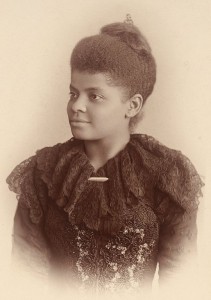Celebrating Women

At an early age, black girls are branded as public menaces. They are suspended and expelled for “defiance” at greater rates than white boys who commit actual felony offenses. They pack the juvenile halls and adult prisons of the most prolific “first world” jailer on the planet. In textbook history, their connection to radical social change begins and ends with a saintly, defanged Rosa Parks, while white women assume center stage in the women’s movement. There is little mainstream feminist discourse linking black women’s historical erasure with their criminalization; no women’s rights outrage over how the disfigurement of black women’s image buttresses mass incarceration.
In their landmark 1982 anthology on black feminism, Gloria Hull, Barbara Smith and Patricia Bell Scott proclaimed that “all the women are white, all the blacks are men, but some of us are brave.” Perhaps no other early twentieth century feminist embodied the spirit of this sentiment more fiercely than anti-lynching activist Ida B. Wells. A giant of the independent black press, and an early media literacy educator, Wells’ leadership and uncompromising vision continue to reverberate for black women. In an era in which International Women’s Day and Women’s History Month inspires only token attention — and then mostly to heroic white women—in American public education, her visionary organizing has been criminally marginalized. Long before daycare and leave time, Wells, like scores of other “faceless” activist black women, was a caregiver navigating the divide between her domestic responsibilities and her life’s work as the most militant media watchdog of her time.
Accused of not knowing her place because she challenged the vacuum in male leadership around lynching, Wells struggled for recognition and compensation for her work. The constant juggling of her roles as writer, activist, orator and mother loomed large in both her public and private stance on women’s rights. Wells once boasted that she was perhaps the only nursing mother to travel nationwide to give political addresses. After the birth of her second child she announced that she was retiring from public activism to devote all her energies to motherhood. Three months later she came blazing back onto the national stage in protest of the lynching of a black postmaster and his family.
In her fearless defense of lynching victims and African Americans’ right to due process, Wells often bucked the backward conventional wisdom of the era. When she began her campaign against lynching in the late 19th century there wasn’t consensus among African Americans that lynching was worthy of a national social justice movement, nor was there agreement about the terroristic sexual politics that motivated white lynch mobs. Wells was perhaps the first journalist to speak out on the racist and sexist implications of lynching. In her editorials she consistently blasted the hypocrisy of white savagery against black men accused of raping white women and exposed the long history of black female sexual exploitation by white men. Catapulted into twenty first century America, Wells might not be surprised at the power that this legacy has had on contemporary media images of black femininity. She might not be surprised that reconciling black liberation struggle with feminism is still dicey. As an outspoken suffragist and defender of the black female image she would have choice words for the young woman who told me recently that it’s okay when she’s addressed as a bitch or a ho because “I know I’m not one.” As a Chicago organizer ever skeptical of black politicians, she might have initially celebrated the election of Barack Obama, then used her bully pulpit to separate the rhetoric of post-racial inclusion from the reality of racial apartheid. And as an early critic of western gunboat diplomacy she would have seen a clear connection between the U.S. government’s interventionist policies and its imperial relationship with over-incarcerated black communities.
Despite her challenges to the American criminal justice system, her long record of publication at home and abroad, and her influence on Frederick Douglass and W.E.B. DuBois (both of whom were ambivalent if not threatened by her single-mindedness), Wells’ legacy remains undervalued. Eclipsed by the cult of charismatic masculinity that privileged the contributions of male leaders like Douglas and DuBois, her relative obscurity parallels her conflicts with a black political establishment that deemed her too radical for her gender. Remarking that “the people must know before they can act, and there is no educator to compare with the press,” Wells remains a beacon of justice and a testament to the radical power of feminist media literacy.
